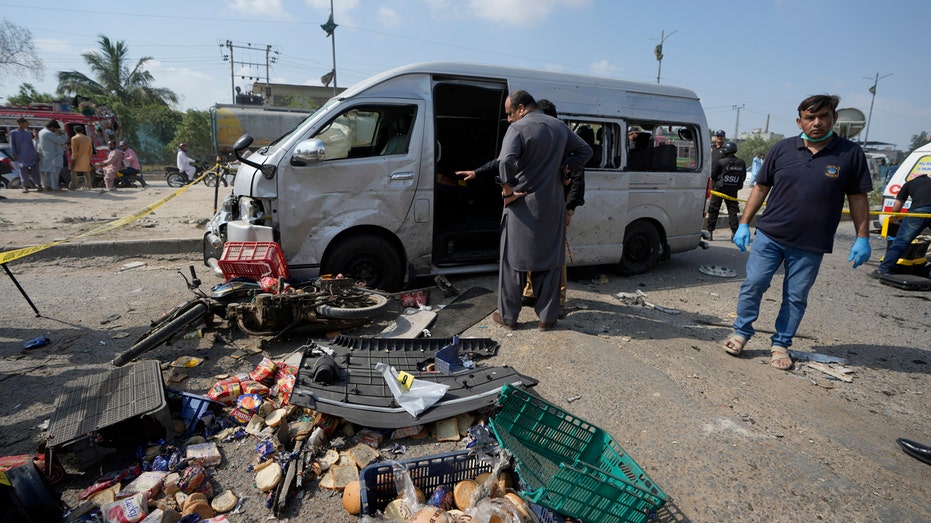A suicide bomber detonated his explosive-laden vest near a van carrying Japanese autoworkers in Pakistan’s port city of Karachi on Friday, police said. They narrowly escaped the attack but three bystanders were wounded.
Separately, an Afghan Taliban religious scholar was killed in an attack in the southwest of Pakistan the previous day.
The attack on the van happened when it was heading to an industrial area where the five Japanese nationals worked at Pakistan Suzuki Motors, local police chief Arshad Awan said. He said police escorting the Japanese returned fire after coming under attack, killing an accomplice of the suicide bomber whose remains were found at the scene of the attack.
12 ARRESTED IN CONNECTION TO PAKISTAN SUICIDE BOMBING THAT KILLED 5 CHINESE NATIONALS
“All the Japanese who were the target of the attack are safe,” Awan said.
Pakistani President Asif Ali Zardari and Prime Minister Shehbaz Sharif denounced the attack. In separate statements, they praised police for quickly responding and foiling the attack. They also vowed to eliminate terrorism and prayed for the speedy recovery of the wounded.
Images on local news channels showed a damaged van as police officers arrived at the scene. Awan said the three passersby who were wounded in the attack were in stable condition at a hospital.
Police were escorting the van after receiving reports about possible attacks on foreigners who are working in Pakistan on various Chinese-funded and other projects, said Tariq Mastoi, a senior police officer. He said a timely and quick response from the guards and police foiled the attack and both attackers were killed.
No one immediately claimed responsibility, but suspicion is likely to fall on a small separatist group or the Pakistani Taliban who have stepped up attacks on security forces in recent years. Insurgents have also targeted Chinese who are working in Pakistan on projects relating to the China-Pakistan Economic Corridor, which includes a multitude of megaprojects such as road construction, power plants and agriculture.
In March, five Chinese and their Pakistani driver were killed when a suicide bomber in northwest Pakistan rammed his explosive-laden car into a vehicle when they were heading to the Dasu Dam, the biggest hydropower project in Pakistan, where they worked.
However, Japanese working in Pakistan have not been the target of any such attacks.
Karachi is the largest city in Pakistan and the capital of southern Sindh province.
Separately, an Afghan Taliban religious scholar, Mohammad Omar Jan Akhundzada, was killed by gunmen inside a mosque in Quetta, the capital of Pakistan’s southwestern Baluchistan province, a local police officer Akram Ullah said Friday.
No one claimed responsibility for the attack, which happened on Thursday.
Chief Afghan Taliban spokesperson Zabihullah Mujahid denounced the killing of Akhundzada on Friday, saying Akhundzada taught at a jihadi seminary in Afghanistan’s Kandahar province and was a member of the Taliban oversight committee of Islamic scholars.
Many Afghan leaders and scholars had lived in Quetta and elsewhere in Pakistan before the Afghan Taliban seized control of Afghanistan in mid-August 2021 as U.S. and NATO forces withdrew. Most then went back and it was unclear why Akhundzada was still in Pakistan.




